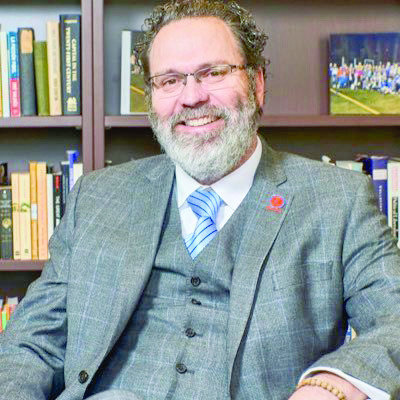St. Francis College recently announced plans to move to a newly designed campus in the center of Downtown Brooklyn.
The relocation will move the school a few blocks away from its current location on 180 Remsen Street into a new 254,699-square-foot space across the fifth, six, and seventh floors of the Wheeler Building at 181 Livingston Street.
Since the announcement, some alumni have expressed concerns about the future of the 162-year-old Franciscan institution, as well as the connection one of the people who brokered the move has to the college’s former president.
New St. Francis president Miguel Martinez-Saenz discussed the move and the rumors surrounding it.
“The college has been talking about a relocation for more than a decade, this isn’t a new conversation,” Martinez-Saenz explained over the phone. “When I arrived the conversation was about accelerating the moving process.”
Martinez-Saenz explained that while many people hold a sentimental attachment to the Remsen Street location, the cost of refurbishing the old facility would be much greater than simply moving to a new building.
“The challenge with the existing campus is that maintenance is beyond what we could do,” he said. “If we had a master plan to remodel the Remsen Street property it would be a 20-year process. Faculty, students, and staff would be subjected to 20 years of construction.”
St. Francis used the real estate firm Cushman & Wakefield to help with the relocation process. Patrick Dugan, a St. Francis alum and son of the college’s former president Brendan Dugan, was a part of the team representing Cushman & Wakefield in the transaction.
Since the move was announced, some alumni have noted that Patrick Dugan’s affiliation with the sale seemed suspicious.
Martinez-Saenz was resolute in stating that the family relationship had no bearing on the college’s decision to move.
“The process to identify a real estate broker was competitive,” explained the current president. “We received applications from 12 brokerage houses and seriously interviewed four. Patrick Duggan was a part of the team that came to pitch Cushman-Wakefield, but that was not the reason we chose them. Cushman-Wakefield is exceptional.”
Martinez-Saenz was also quick to dispel rumors about downsizing.
“Although it appears that the square footage is less, from a learning perspective it will be more space,” he said. “We are downsizing the back-office operation in terms of space and are using that space for more academic programs. The board and I were always thinking about how to improve the student experience.”
He also explained that the school has continued to hire during the pandemic, primarily to prepare for the launch of multiple new academic programs.
St. Francis currently has a lease-purchase option for the new Livingston Street location. However, they have not yet sold the property on Remsen Street .
The school will move its academic operations into the new location for September 2022, but will potentially continue using the Remsen Street building for athletic programing.
“We are looking at the possibility of having athletics at the Remsen property past 2022,” explained Martinez-Saenz. “We are also working to secure alternatives so we can continue our athletics program uninterrupted.”
The school’s soccer team already practices and plays at Brooklyn Bridge Park, and Martinez-Saenz suggested the possibility of establishing similar relationships with public and private entities to secure access to athletic facilities.
“We are doing transition planning and long-term planning,” he said. “It will be a comprehensive solution.”
Despite some compromises, Martinez-Saenz is confident the new campus will greatly benefit the school going forward, and will be particularly beneficial in the post-pandemic world.
“This space will allow us to be at the cutting edge of technology,” he said. “We want to make sure we have space allocation to very quickly socially distance if needed.”
Located above the art deco Macy’s on Livingston Street, the new campus facility includes flexible labs and classrooms, 300-seat auditorium, 260-seat cafeteria with kitchen, screening room for films, 6,600-square-foot library, and outdoor terraces with views of the city.
The new campus is a component of the school’s larger SFC Forward initiative, a long-term plan to modernize and make St. Francis competitive in the 21st century.
Under SFC Forward, the college will offer new master’s degrees in exercise and sports science, special education, sports management, and public health.



